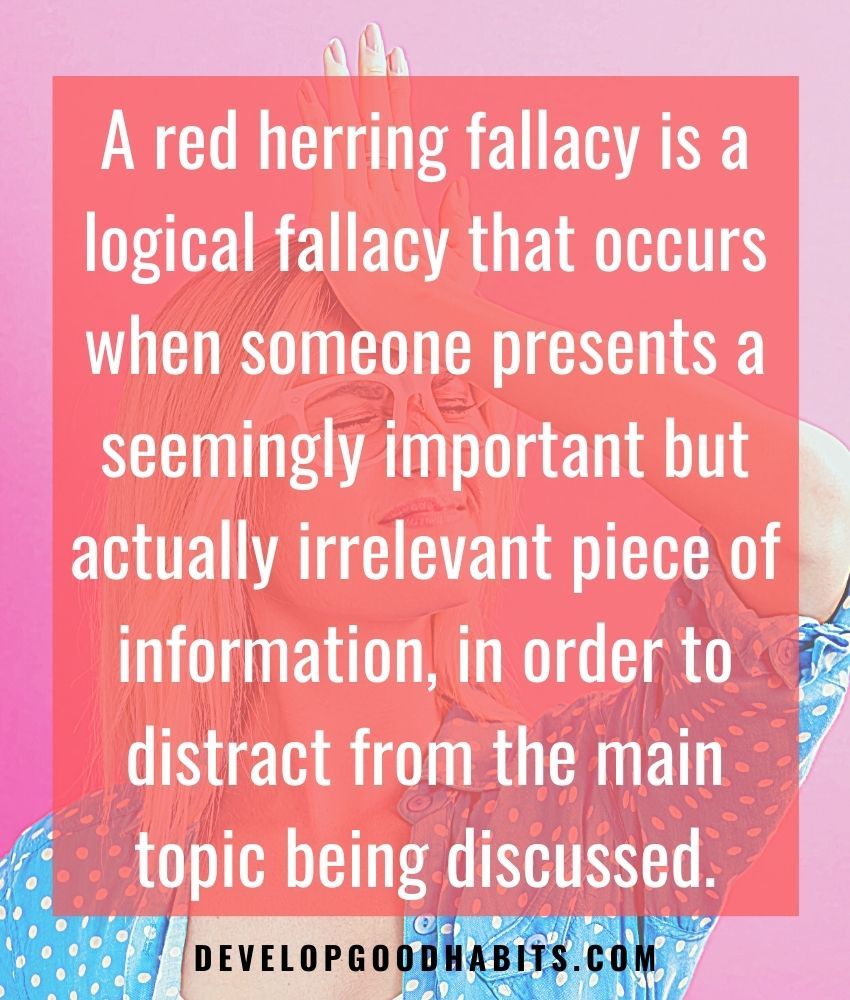In literature circles, a red herring is a narrative element that is meant to mislead readers by providing irrelevant information. For example, an author might introduce some plot point to distract the reader and mislead them so the ending is more surprising.
Red herrings also pop up in rhetoric and argumentation. A red herring fallacy is a logical fallacy that occurs when someone presents a seemingly important but actually irrelevant piece of information, in order to distract from the main topic being discussed. Red herring fallacies are often used to obfuscate and derail a conversation, rather than facilitate a debate.
Red herring fallacies are particularly troublesome not only because they’re fallacious, but also because they can completely stall any debate or conversation. That is why it’s extremely important to be able to point out when someone is presenting irrelevant information in their argument.
What is a Red Herring Fallacy?
In literature, red herrings are often used to build suspense or mystery. A red herring might be a plot point, character, or some other occurrence that serves to distract the reader from the truth of the narrative.
For instance, the character Bishop Aringarosa in the Da Vinci Code by Dan Brown is a red herring. The entire story is written to imply that Aringorosa is the shadowy mastermind behind the book’s plot.

However, the novel later reveals that Aringarosa is actually innocent, and other people are pulling the strings. Aringarosa’s character is meant to distract and mislead the reader so that the end reveal is more surprising (Fun fact: the Italian name “Aringarosa” translates to “red herring” in English. The more you know!).
In debate and rhetoric, red herring fallacies occur when someone presents a piece of information that is actually irrelevant to the topic being discussed. A red herring can be a way to dodge a question, avoid talking about some point, or distract from the main issue.
Here is a simple example of a red herring fallacy. Imagine the following conversation between a reporter and a politician:
Reporter: “What steps would you take to deal with current issues involving immigration in the US?”
Politician A: “I have been working hard to make this country successful for its citizens, unlike my opponent, who favors completely open borders and mass generational immigration.”
Politician A is clearly committing a red herring fallacy. In response to a question asking about their views on immigration, A instead talks about his opponent’s stances. Even if it’s true that their opponent wants open borders and such, it is irrelevant to the topic at hand. The reporter did not ask a question about their opponent’s views on immigration. They asked them about their views.
Red herring fallacies also pop up in more benign, everyday contexts. Consider this conversation:
Bob: “I’m disappointed you broke your promise and didn’t help me move.”
John: “Oh yeah? What about that time you didn’t show up to my birthday party?”
John’s statement commits the red herring fallacy. It’s a red herring because it is irrelevant to the context. John broke a promise and Bob has a legitimate grievance. Instead of addressing that, John brings up a completely different issue that is irrelevant to the current context.
Red herring fallacies are often used in debate contexts to shift the topic of conversation. It is often used when one person wants to avoid a line of questioning or avoid committing to a specific position. Red herring fallacies function to derail conversations, which is why they can be so frustrating.
Logical Form of Red Herring Fallacies
Red herrings are not so much a matter of logic but rhetoric. In that sense, red herring fallacies are informal fallacies. As such, red herring fallacies do not really have a logical structure, which is one reason why they are fallacious. Red herrings are non-sequiturs—they do not follow from the previous premises of the argument.
In one sense, all logical fallacies are a kind of red herring in that all fallacies highlight irrelevant justifications for an asserted conclusion. Fallacies occur when someone’s argument is more or less irrelevant to their conclusion.
More specifically, red herrings can be considered a kind of fallacy of relevance, along with other common logical fallacies such as ad hominem or appeals to authority (argumentum ad verecundiam). In all of these cases, fallacies of relevance work by bringing up things that are not relevant to the context or argument at hand.
Red herrings are also commonly seen in conjunction with false dichotomies and slippery slope arguments. False dichotomies can be a kind of red herring to obscure alternate positions or a slippery slope argument can function as a red herring by highlighting an irrelevant chain of cause and effect.
5 Red Herring Fallacy Examples
1. Black Lives Matter and Black-on-Black Crime
“Black Lives Matter protestors claim to care about black lives, but they are hypocrites. They never say anything about the dozens of black people killed every day due to gang violence in Chicago. How can they believe black lives matter if they do not condemn black-on-black crime?”
This is a particularly pernicious and damaging argument that people bring up to discredit movements for racial justice. The Black Lives Matter movement is based specifically around protesting disproportionate police violence against black and brown people. Bringing up gang violence and black-on-black crime as a means to deflect from the central issue is a red herring fallacy.
Black on black crime is irrelevant to the issue of police brutality against black communities, and bringing it up only serves to derail the conversation and reinforce a stereotype of black people as inherently criminal.
Think of it this way: It would be absurd to say that someone decrying the Catholic church for covering up sex abuse does not care about bringing other pedophiles to justice. They are focused specifically on the issue of sex abuse in the Church, and bringing up other instances of sexual abuse would be irrelevant to the point being made.
2. Police Violence and Criminal Histories
Very often, people will appeal to irrelevant pieces of information to justify police shootings and killings. Here is a recent example you probably have heard:
“George Floyd was not a hero and people should not be protesting his death at the hands of the police. After all, George Floyd had a past criminal record and was no angel. Why do liberals insist on venerating criminals?”
This argument is a red herring because it brings up George Floyd’s past criminal history as a means to deflect from criticisms of the police who murdered him. The fact that someone has a past criminal history is in no way justification for them being killed or injured by the police.
Bringing up Mr. Floyd’s past criminal history is completely irrelevant to the situation as the circumstances of his murder were not related to his previous criminal history at all. Referencing his criminal history is a form of character assassination that serves to justify police brutality.
3. Tone Policing
Tone policing is a form of red herring in which a person attacks the presentation of an argument rather than the content of the argument. Here is an example:
“I would agree with feminists more if they weren’t so shrill and in your face about their beliefs. They should try to be more civil or else they won’t convince very many people.”
This is a form of tone policing because it shifts the focus of the conversation to the presentation of an argument rather than the content of an argument. Very often, people use tone policing to dismiss a person’s entire argument, as they dislike how it is presented. More often than not, tone policing is a red herring as it is used to avoid confronting an argument.

Sometimes, criticizing someone’s tone of argument is legitimate. It is important to distinguish when someone’s tone is legitimately destructive to rational debate or when concerns about tone are being raised simply to distract from the main issue. Criticizing someone’s style of argumentation can be a legitimate response in some cases, but it is not in itself a sufficient counterargument.
4. Environmental Regulation
Red herrings can often be used to offload responsibility from one party to another. Here is a relevant example:
“Why should we enact more environmental legislation? What about India and China? Climate activists should be criticizing them instead of the US. If climate activists want people to take them seriously then they need to criticize these other countries.”
Bringing up another country’s poor environmental history as a response to calls for your country to enact environmental regulation is a red herring. It might be true that other countries have a poorer environmental record than the US does. However, that fact in itself is irrelevant as to whether the US should change its environmental behavior.
The fact that other countries pollute does not mean that we should not try to limit our own pollution. Pointing out other countries’ pollution is an attempt to stall the conversation and distract.
5. Donald Trump
President Trump is a large source of red herrings and other fallacious arguments. In 2016, when asked to comment on recordings in which he describes sexually assaulting women, President Trump said the following:
“That was locker room talk. I’m not proud of it. I apologized to my family. […] You know what, we have a world where you have ISIS chopping off heads. […] Yes, I’m very embarrassed by it. I hate it. But it’s locker room talk and it’s one of those things. I will knock the hell out of ISIS, we’re going to defeat ISIS. ISIS happened a number of years ago in a vacuum that was left because of bad judgment and I will tell you I will take care of ISIS.”
This comment is a red herring fallacy. When asked to elaborate on his comments about sexually assaulting women, President Trump changed the topic of discussion to ISIS, which is irrelevant to the topic at hand. When pressed further on the topic, Trump made the following comments:
“And women have respect for me. And I will tell you, no I have not, and I will tell you that I’m going to make our country safe. We’re going to have borders in our country which we don’t have now. […] We’re going to make America safe again.”
This is another red herring fallacy because President Trump brings up the irrelevant topic of border security. Again, the topic of border security has nothing to do with the issue being discussed and is only brought up as a distraction.
Responding to Red Herring Fallacies
The first step to responding to red herring fallacies is recognizing them in the wild. Here are a few things to keep in mind to detect red herrings:
As is the case with most fallacies, the best strategy is to point out why the particular statement/argument is irrelevant to the context at hand. To be more precise, you should show why the statement is irrelevant and how it is being used to change the topic of conversation.
After you point out the red herring fallacy, then you can redirect the conversation back to its original point. Sometimes though, your interlocutor will not let you change the conversation back to its original topic. In those cases, you can either continue with the original topic or accept that the conversation has changed.
Alternatively, you could disengage from the conversation. If a productive conversation is genuinely impossible because the topic keeps being obfuscated, you can save yourself a big headache by bowing out. After all, you are never really obligated to debate anyone.
Final Words on Red Herring Fallacies
Red herrings are tricky fallacies to pick out as they can take many forms. They can be directed at derailing a conversation, avoiding a question, or to intentionally mislead or complicate discussion.
The key to picking out red herrings is to keep your sights focused on the original issue at stake. Red herrings are meant to distract, so the easier you are distracted, the more likely one is to go unnoticed,
If you encounter a red herring fallacy, the best strategy is to point it out and explain why it is irrelevant to the conversation. Keep in mind that sometimes, a person may intentionally be committing a red herring. It is important to charitable interpret your opponent’s argument, and not strawman their position.
Learn More About Logical Fallacies
- 5 Appeal to Nature Fallacy Examples in Media and Life
- 6 Outcome Bias Examples That Can Negatively Impact Your Decisions
- 7 Self-Serving Bias Examples You See Throughout Life
- 7 Omission Bias Examples That Negatively Impact Your Life
- 6 Authority Bias Examples That Might Impact Your Decisions
- 5 Burden of Proof Fallacy Examples
- 5 Appeal to Tradition Fallacy Examples in Life
- 5 Appeal to Authority Logical Fallacy Examples
- 7 False Cause Fallacy Examples
- 7 Appeal to Ignorance Fallacy Examples
- 7 Appeal to Common Sense Logical Fallacy Examples
- 5 Post Hoc Fallacy Examples (and How to Respond to This Argument)
- Gambler’s Fallacy: 5 Examples and How to Avoid It
- 5 Appeal to Anger Fallacy Examples Throughout Life
- 7 Halo Effect Bias Examples in Your Daily Life
- 7 Poisoning the Well Examples Throughout Your Life
- 7 Survivorship Bias Examples You See in the Real World
- 7 Dunning Kruger Effect Examples in Your Life
- 7 Either Or (“False Dilemma”) Fallacy Examples in Real Life
- 5 Cui Bono Fallacy Examples to Find Out “Who Will Benefit”
- 6 Anchoring Bias Examples That Impact Your Decisions
- 7 Virtue Signaling Examples in Everyday Life
- 7 Cherry Picking Fallacy Examples for When People Ignore Evidence
- 9 Circular Reasoning Examples (or “Begging the Question”) in Everyday Life
- 9 Appeal to Emotion Logical Fallacy Examples
- 9 Appeal to Pity Fallacy (“Ad Misericordiam”) Examples in Everyday Life
- 9 Loaded Question Fallacy Examples in Life and Media
- 9 Confirmation Bias Fallacy Examples In Everyday Life
- 9 Bandwagon Fallacy Examples to Prevent Poor Decisions
- 9 Middle Ground Fallacy Examples to Spot During an Argument
- 5 False Equivalence Examples to Know Before Your Next Argument
- 7 Hasty Generalization Fallacy Examples & How to Respond to Them
- What is the Planning Fallacy?
- How to Overcome the “Sunk Cost Fallacy” Mindset

Alex Bolano is a freelance writer based out of St. Louis. He holds his MA in Philosophy and writes on topics relating to science, culture, politics, finance, and education. He enjoys playing video games and researching the latest trends in science and technology.


